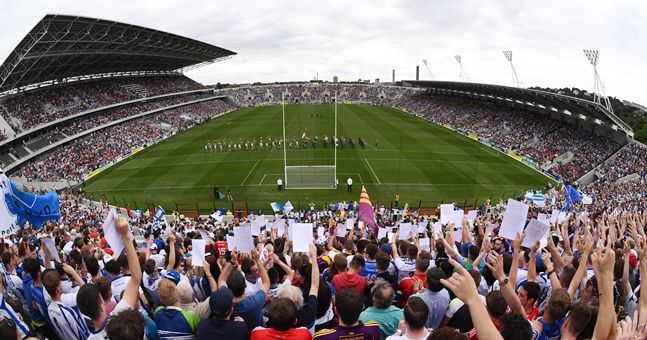

Share
1st November 2017
10:11am GMT

 Some of Ireland's most cherished GAA grounds raised flags with the independent consultants assessing each of the three bids. On four of the country's big GAA grounds, the report noted:
Some of Ireland's most cherished GAA grounds raised flags with the independent consultants assessing each of the three bids. On four of the country's big GAA grounds, the report noted:
'Pairc Ui Chaoimh, Pearse Stadium and Fitzgerald Stadium require a significant level of overlay which is flagged as a risk, given the amount of work required to bring these venues up to RWC standard. 'Casement Park is scheduled for redevelopment by 2020 and will also require a significant level of overlay. At time of writing, we understand that this venue is still subject to final planning approval.'Ireland's proposal contained a plan for seating and standing in venues - 81% of all tickets sold would be seated and the remaining 19% would be standing [95% to 5% standing for knock-out games]. That was never going to go down well with World Rugby, who insisted on New Zealand putting in temporary stands at Eden Park, for the 2011 World Cup, on the terraced ends of the ground. The lay-person may also ask what the recently completed and much-praised Pairc Ui Chaoimh needs to do to get up to 'RWC standard' but each venue will need ample space to accommodate broadcasters and corporate needs [tents, hosting areas, extra concession and merchandise stands]. World Rugby wants a 500-metre radius around each stadium to use as its own for game-days. In terms of host cities, the lowest population bases in France are Bordeaux, Lille and St-Etienne [200,000]. Ireland's lowest is Killarney, with a given population of 14,219, while Galway and Limerick both have populations under 100,000. The report notes Killarney 'is not sizeable, with less experience in large scale international events'. Another tick against Ireland. Many involved in the GAA will carry on with their lives and not worry too much about the opinion of how much money can be shook from their stadiums and cities. As for legacy, while each ground would be fortunate enough to be spruced up, many of the measures would be temporary - a rugby circus rolling into town and sticking tents up only to roll out leaving colourful memories, vague toothache and little else. World Rugby looks to be following the money on this one. It will want to boost its coffers amid the uncertainty surrounding Japan in 2019. They see the seats and the possibilities of filling those seats as the draw. Ireland may be showing the quaint, fun-loving bird in the hand but World Rugby wants the two fluttering away in the bush. Maybe Ireland will get the chance to host the World Cup, then, in 2027. Maybe Casement Park will be built by then too...
Explore more on these topics: